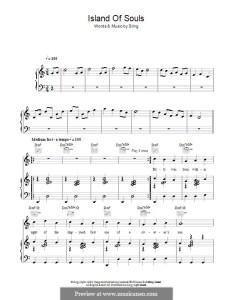Pipes and Insights

Sting The Soul Cages (A&M Records)
The Soul Cages is replete with such observances, with the one about finding your own pathway chief among them: “We come into the world alone and we leave alone,” Sting mused, at the time of the album’s release. “I mean, I’m not anti-religious, but if you believe anything wholesale, you open yourself up to a lot of perversions of the initial content. That’s unhealthy. The core ideas behind ideologies are great, but invariably they get twisted. I’m not an expert. I’m just working on myself. That’s the path to choose.”
Some of those “core ideas” went well beyond this one album. As a matter of fact, they spilled over into his next project, the supremely joyful Ten Summoner’s Tales (A&M) from 1993, whose opening track, “If I Ever Lose My Faith in You,” feels suspiciously like an extension of his previous ruminations concerning ideology and religion:
You could say I lost my faith in science and progress
You could say I lost my belief in the holy church
You could say I lost my sense of direction
You could say all of this and worse but
If I ever lose my faith in you
There’d be nothing left for me to do
From the outward and external to the personal and introspective, Sting admits that, for him, losing faith in established institutions is pretty much par for the course (today, he considers himself more of an agnostic than a true believer). But God help us if our belief in those we love were ever crushed. “There’d be nothing left” to do, he confides.

“Island of Souls” song sheet
This leads us back to The Soul Cages, which is all about our inability to prevent the inevitable. Beginning with the spellbinding “Island of Souls,” a brooding paean to Sting’s younger self (as the character “Billy”) and his hardworking father’s daily grind, we hear the unsettling sounds of Northumbrian pipes. A bagpipe-like instrument from the northeast of England, they act as a thematic motif, recurring at strategic points in the number and placed intermittently throughout the rest of the album.
Performed here by Kathryn Tickell (who also plays on the cut “Fields of Gold” from Ten Summoner’s Tales), the pipes are Sting’s way of channeling the inescapable strain of “Amazing Grace,” but without actually quoting that funereal air. They’re backed by Paola Paparelle’s plaintive oboe, followed by a rush of strings (electronically enhanced, I presume) and Dominic Miller’s swirling guitar licks:
Billy was born within sight of the shipyard
First son of a riveter’s son
Darkness and desolation are everywhere, as conveyed in Sting’s droning delivery and in the song’s achingly expansive melodic line:
And Billy was raised as the ship grew a shadow
Her great hull would blot out the light of the sun
There’s no hope in this godforsaken abode, no “light of the sun” to lead them out of the “shadow” of this ship’s “great hull,” which casts an enormous pall over their lives:
And six days a week he would watch his poor father
A working man live like a slave
He’d drink every night and he’d dream of a future,
Of money he never would save
And Billy would cry when he thought of the future…
Later on, he poses a query to himself:
What else was there for a riveter’s son?
A new ship to be built, new work to be done
Endless drudgery is their lot, not only for his father but also for young Billy. His voice rising in pitch and emotion, escape is only possible, we’re told, if dad and Billy flee this oppressing state. Written as an exercise in stream of consciousness, Sting’s words poured out of him like waves on a beach at high tide.
Toward the middle of the piece, Billy’s father experiences “what they call an industrial accident,” and it’s only after dad’s agonizing death that Billy “dreamed of the ship in the world” that
Would carry his father and he
To a place they could never be found
To a place far away from this town,
A Newcastle ship without coals
They would sail to the island of souls.
The song ends with a sort of repetitive humming:
Oom-lay
Lay-day oom-lay
Oom-lay
Lay-day oom-lay
This quasi-Third-World chant is punctuated by loud hammer strokes, signifying the toils of labor and the never-ending demands of work and industry. As expected, those Northumbrian pipes now return, fading in, then out… out into the studio landscape. But the last sounds to be heard are those of a ghostly whine, the breath of life seemingly eking out, the wind blowing softly in the distance – the utter finality of death.
You’re probably saying to yourself, Man, that’s deep shit! And you’d be right. But that’s Sting for you, the thinking man’s rocker. He takes a 180-degree turn with the seriocomic “All This Time” (already commented on above), before getting down to business with the waltz-like “Mad About You,” the third track on the program, which The Baltimore Sun’s J.D. Considine once described as “the album’s only love song” – that is, “romantic passion in terms of desperate insanity.”
Talent and World Beat
The album’s formidable array of talent, which includes power drummer Manu Katché, keyboardists Kenny Kirkland and David Sancious, the aforementioned Dominic Miller on guitar, Branford Marsalis on saxophone, and an all-star lineup of percussionists, commencing with the incomparable Ray Cooper, Vinx, Bill Summers, Munyungo Jackson, Skip Barney and Tony Vacca – let’s not forget the singer-songwriter himself, Mr. Gordon Sumner, on vocals, bass, synclavier and mandolin – finally break out in a sizzling jazz-based jamfest called “Jeremiah Blues (Part 1),” one of those apocalyptic rock bromides so beloved of the nineties.

“Why Should I Cry For You?” (nnm.ru)
From there, we’re treated to the sonic splendors of the elegant “Why Should I Cry For You?” This is where Sting and I part company, so to speak, but it’s not what you think. Sting has gone on record as, supposedly, having taken out “any Afro-Caribbean or other world influences on the [album]. I enjoy that music, and I like making it, but it didn’t seem to apply. So the bulk of the record is based on Celtic folk melodies.”
Not quite. Listen closely to this cut. It’s a stunner. For one, the poetry and word-painting are of the highest caliber. For another, the sea terms employed are not only accurate but breathtaking in their scope and beauty, while the melodies are overladen with a distinctive gait and rhythmic buoyancy that belong to no other musical genre than world beat. I would venture to guess that the Stinger, whose support of green causes and “Save the Rain Forest” efforts, may even have borrowed a musical phrase or two from Brazil’s own Milton Nascimento, his albums “Sentinela” and “Anima” from the early eighties being major influences on many an artist’s output. Judge for yourself:
Under the dog-star sail
Over the reefs of moonshine
Under the skies of fall
North, northwest, the stones of Faroe
Under the Artic fire
Over the seas of silence
Hauling on frozen ropes
For all my days remaining
But would north be true?
Additionally, “Why Should I Cry For You?” is also a love song, but one where his father’s features and nostalgic memories of the “old man” from “All This Time” and “Island of Souls,” keep coming back to haunt Sting’s thoughts. It’s impossible for the listener to miss the connotation. The pain, the loss, the overpowering love and affection for the dearly departed are omnipresent and unmistakable in the work’s poignant lyrics:
Dark angels follow me
Over a godless sea
Mountains of endless falling,
For all my days remaining,
What would be true?
Sometimes I see your face,
The stars seem to lose their place
Why must I think of you?
Why must I?
Why should I?
Why should I cry for you?
Why should he indeed, but he does cry for him – or for her, if you prefer a more starry-eyed viewpoint. The accompanying black-and-white video stresses the more romantic aspects, but that’s the beauty of this theme: it’s open to multiple meanings, irrespective of commercial considerations.
(To Be Continued)
All songs were written and arranged by Sting © 1990 Magnetic Publishing, Ltd./Blue Turtle Music (ASCAP), and © 1993 Blue Turtle Music (ASCAP)
Copyright © 2013 by Josmar F. Lopes

